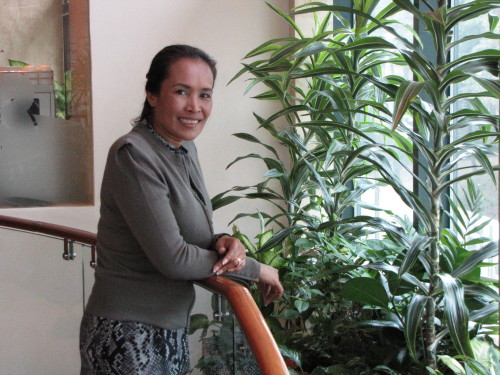“I tried to escape. I was in France for one year and a half,” she said. “When you survive and leave and you are hating all people, hating men and even hating your husband ... this is hating life. I had to go back to find a way to survive.”
On returning as a volunteer for Medecins Sans Frontieres, she soon realized the women she met in the brothels needed not only condoms she was handing out, but a means of escape.
“I went back to the brothels and met young girls there. The clients there were cutting the girls in the brothel. One girl said to me, if you come here and give me condoms the next day my clients come in drunk and they won’t use it and they are beating me. If you really want to help me, you will get me out of here,” she recalled.
“I was like them before, and I remember when I needed someone to help me and there was no one.”
After failing to garner support from MSF and other NGOs, Mam started to help the women alone, taking 10 sex workers into her own home in 1996. Eventually she launched the Somaly Mam Foundation in 2007, to raise funds to support anti-trafficking organizations and to give victims a platform from which their voices can be heard around the world.
Her organization offers phased rehabilitation and self-support programs for victims of sexual slavery by providing them with shelters, psychological counseling and educational courses.
Mam still lives among the women and children she rescues, continuing her work in the face of death threats and violence from brothel owners and users.
She gained international support following the publication of her memoir, “The Road of Lost Innocence,” and has been awarded for her work by many international organizations.
She was honored as one of Time Magazine’s 100 Most Influential People of 2009 and is a CNN Hero. She also received the Prince of Asturias Award for International Cooperation, The World’s Children’s Prize for the Rights of the Child, Glamour Magazine’s 2006 Woman of the Year Award, and has won accolades from the U.S. Department of Homeland Security.
But she said the POSCO award was special because it was the first recognition of her work from Asia.
“Even though I have received a lot of awards, usually foreigners are the ones who are supporting me,” she said. “This is the first time I feel that Asia recognized me, and especially Korea. Of course I am happy and honored. I feel that Asia starts to open its mind.”
She said she would use the $170,000 prize money to start an agricultural project near one of her Cambodian shelters, to help the women who lived there feed themselves when funds were low.
Mam runs shelters in Cambodia, Laos and Vietnam but still feels her efforts don’t go far enough.
“I have saved more than 7,000 but it is not a lot,” she said. “I am not a good person myself, I have my own emotions and I get angry, but I get a lot of strength because of the girls.”
One is currently attending law school in Cambodia, and another is set to study medicine in September.
“When I see those girls I am so proud,” Mam added. “A lot of girls are very smart girls, I don’t know how they do it but I am very proud. For them it is not easy to come to the center and just stay there. They have a lot of bad memories.
“It is not all success. These girls have been raped, they are very emotional and sensitized. I tell everyone, you can save a girl in five minutes but it will take five to 10 years for them to recover. Saving them is easy, but the rest takes time.”
She said that more needed to be done by governments to help tackle the root causes of sexual trafficking around the world.
“It is easy to say that Asia and Cambodia are not doing enough but other countries, but all governments are not doing enough. Even I am doing my best but I am not perfect and I am not doing enough,” she said. “Each government needs to work together between the rich and poor countries ― between the sending countries and the receiving country.
“Don’t let NGOs do it because we do not have the power. I can save 1,000 girls but if the country is corrupted then there will be 1,000 more going back to the brothels. Local NGOs can do something but we can’t solve the problem long term.”
¡¡Throughout all her work, it is not hatred toward the attackers, but love that spurs her on.
¡¡Although Tomdy, the first girl she helped, died from AIDS and tuberculosis three months after Mam found her, the teenager told her rescuer she would be there looking over her shoulder forever.
Mam, who has named one of her refuge centers after her, said: “Before she died she was a very strong girl. She told me that she wanted me to help others. Before she died, she said: ‘I am dying but I am happy to die because I have you.’”
For more information go to: www.somaly.org.
By Kirsty Taylor (
kirstyt@heraldcorp.com)





![[Exclusive] Hyundai Mobis eyes closer ties with BYD](http://res.heraldm.com/phpwas/restmb_idxmake.php?idx=644&simg=/content/image/2024/11/25/20241125050044_0.jpg)
![[Herald Review] 'Gangnam B-Side' combines social realism with masterful suspense, performance](http://res.heraldm.com/phpwas/restmb_idxmake.php?idx=644&simg=/content/image/2024/11/25/20241125050072_0.jpg)

